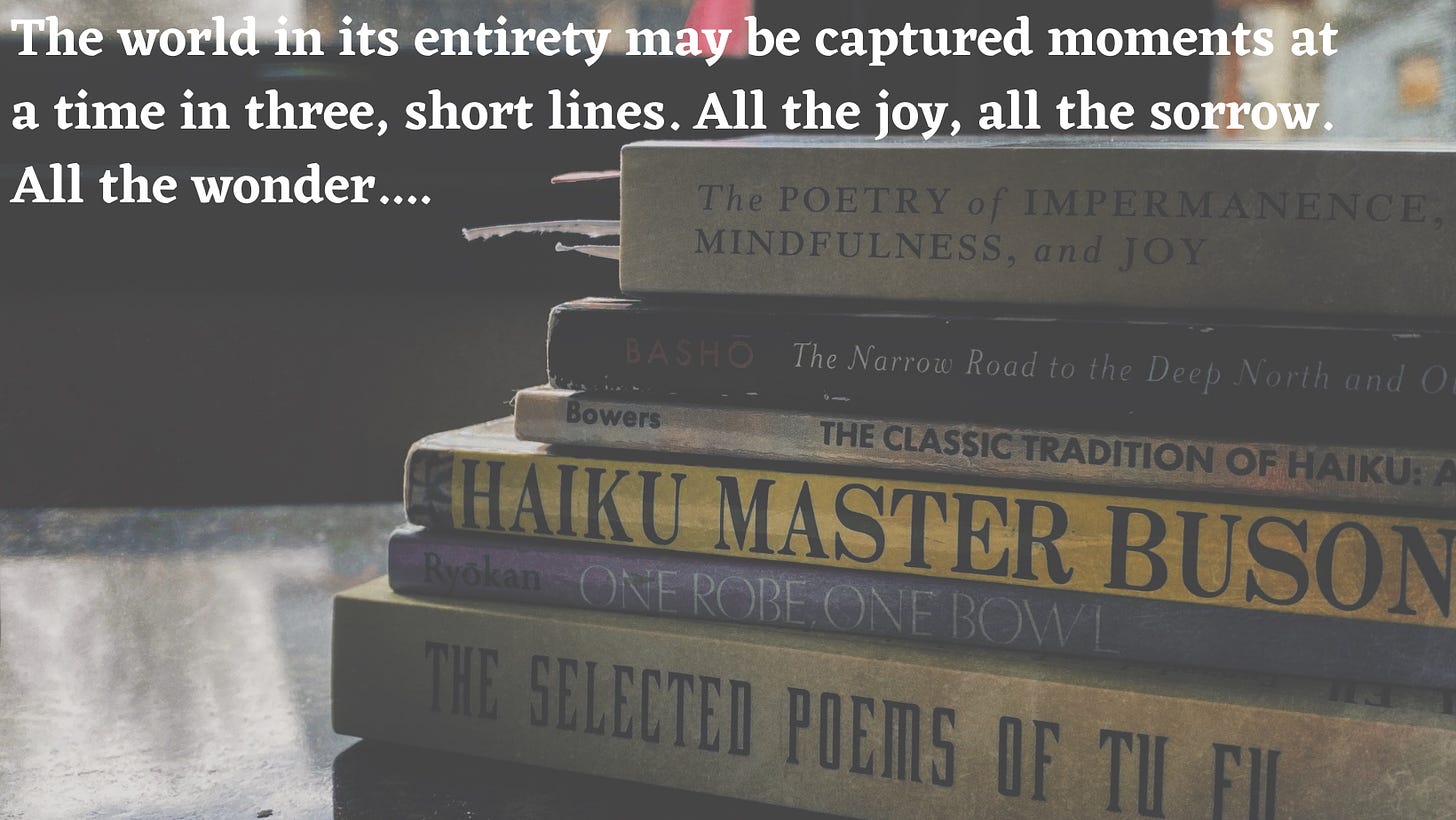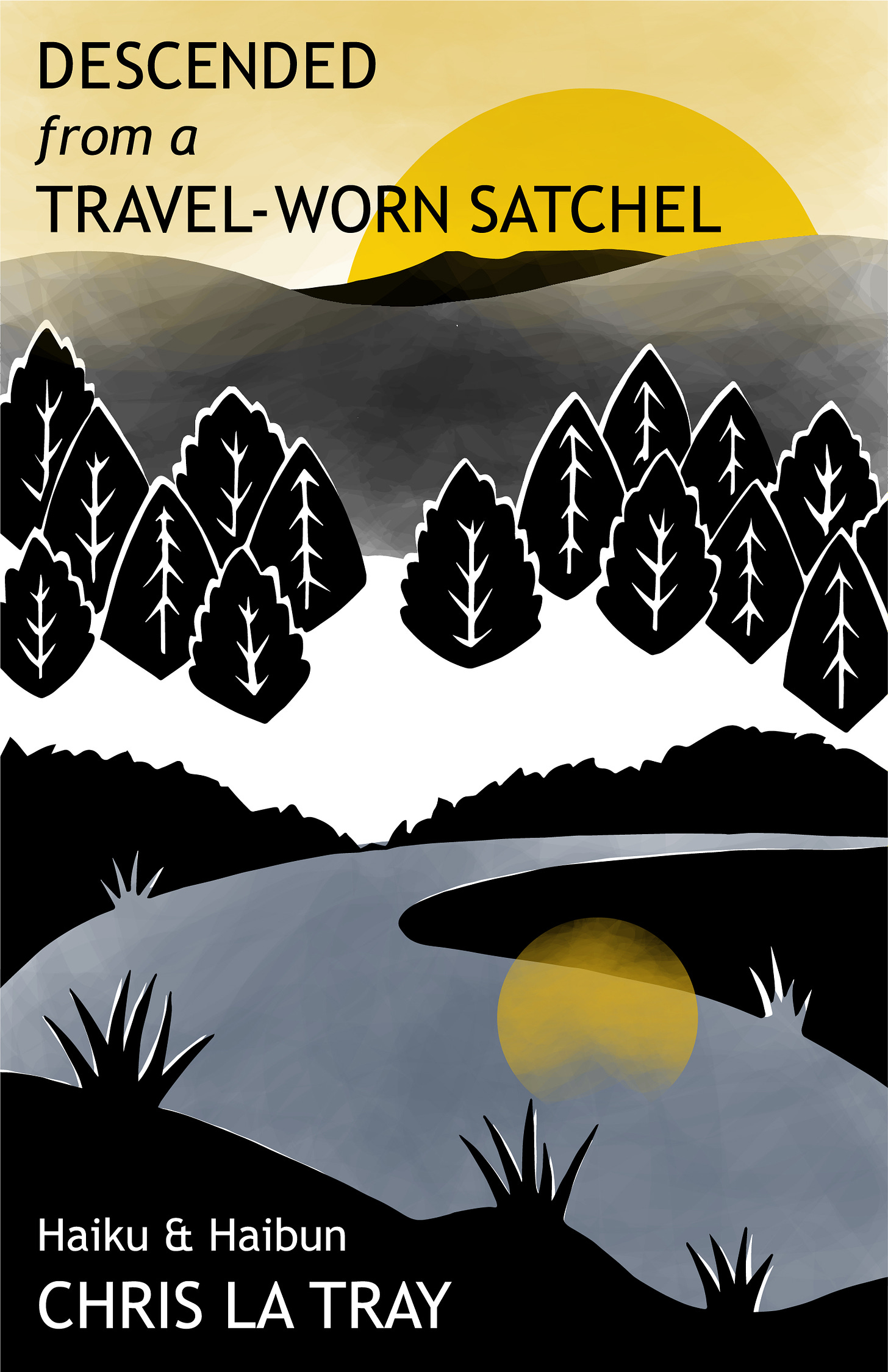I’m taking a break from the usual doom and gloom around here to report some exciting (*cough*) personal news: I have a new book coming out!1 And now you can preorder it! It’s called Descended from a Travel-worn Satchel, and you can preorder a copy—signed and personalized if you desire—HERE. It will be available by mid-September.
If this book seems like it’s arriving under the radar, it is. Here’s how it happened. Ever since One-Sentence Journal came out, I've been dabbling in writing "true" haiku. I began the process because, after having what I was doing with my short poems consistently compared to haiku I decided to take a closer look at the form. Soon I developed an overwhelming affinity for it. Initially it was the old Japanese poets and the work they were doing (particularly Matsuo Bashō, which this book is something of an homage to2), but then moved from there to the even older Chinese mountain poets. The discovery of all this work showed me more than anything else that I was contributing to a tradition much bigger and more ancient than anything I ever imagined. I've come to love it.
In a wonderful interview with the reclusive poet David Budbill (d.2016), who spread his own brand of Eastern-influenced poems across several collections, my friend Leath Tonino brings up this specific poetic tradition I'm taking about. Here is their exchange:
Tonino: Could you sketch out what that poetic tradition looks like, or at least the parts you immediately felt a resonance with?
Budbill: For starters, these guys left so-called civilization, in particular the life of politics and government, and went off into the wilderness to live a more reclusive life—to meditate and garden and watch the moon. I was participating in that kind of thing when I came here, although at the time I didn’t know there was a long tradition behind me. Also, there is a simplicity and a directness to the poetry that has always appealed to me. I am a very simpleminded person. I write in a very plain way. I want to write poems that can be understood by just about anybody.
The italics in that last sentence are mine. Because I couldn’t have expressed my own approach better, and to hear it from Budbill makes me grin. I too want to write poems that can be understood by just about anybody.
Here's another interview exchange, this time between Tonino and David Hinton, the renowned poet and translator of ancient Chinese poetry. This is how the interview begins:
Tonino: The rivers-and-mountains poetic tradition has been of particular interest to you. You say it represents the longest literary engagement with wilderness in the history of the world.
Hinton: That’s right. Its philosophical roots go back to Lao Tzu’s Tao Te Ching in the sixth century BCE, and beyond. The poetic tradition began around the fourth century CE and traces a spiritual engagement with landscape that has been a central theme of Chinese poetry ever since. There were other types of poetry, such as social-protest poetry or poems written for parties and farewells, but this core tradition worked its way into even the outermost fringes of Chinese literary culture. Anyone who reads Chinese poetry will see that it’s made out of natural images: birds and clouds and cliffs and flowers.
If you've read One-Sentence Journal you know that this is where so much of what I do in poetry is coming from. This practice of quiet attentiveness and observation is a spiritual one, and is a key element in what makes life living in many, many ways. It is a refuge for me.
Back to writing these poems. Over the ensuing short stretch of years they accumulated. I decided when I got to 300 I would think about taking the ones I like best and maybe self-publish a little chapbook, just for fun. Just for me, really, if I'm honest about it.
Then last winter my friend Mark Gibbons was handed the mantle as editor of the Montana Poets Series 4 from FootHills Publishing. This is a small press out of New York who makes lovely, hand-bound books. When Mark asked if I had anything, I said I had these haiku ... and now here we are. There are also four haibun included, which is a mix of prose and haiku. All of this is explained in the introduction to the book.
I'm happy with it. I think people who like OSJ will like this too. The poems are coming from the same place, just distilled and simplified even more. For me, they are very personal. Each one is a short story of its own, written for myself ... but also with associations that I think other folks may connect to as well. At least that is the hope.
I'm not going to prattle on here any longer. Please consider taking a look at this stuff if you like any of what you read on this newsletter. These poems are a huge part of who I am. This is the work I do for love. Maybe they can be a refuge for you too.
IMPORTANT TO NOTE: The cover, and four interior pieces, are provided by my friend Clare Carpenter. She runs Tiger Food Press out of Portland, Oregon. I love Clare’s work and I’ve had her stuff on my walls for a couple years now. There's talk of making prints or something of these pieces available too. I hope that happens. If you want to see them … well, order the book. Regardless, please check her stuff out. It is beautiful.
Some abbreviated praise from early readers:
Chris La Tray is skillful in the craft of brevity, as demonstrated in his One-Sentence Journal. In Descended … he displays his talent through contemporary haiku and haibun. Offering up poetic evidence of the times he inhabits, he secures his place as a descendant of master Bashō. — Andō, poet, writer and mentor.
In Descended … we are shown, by-example, what it means to be a wakeful-wayfarer; one fully-present to the moment, the road, the lessons of time, history, and the natural world. — Frank La Rue Owen, author of The School of Soft-Attention
The noble mantle once belonging to the Zen poet, Matsuo Bashō, and now patched with duct tape, has landed on the broad shoulders of a Métis writer living in western Montana in the early 21st century. — Holly Wren Spaulding, author of Familiars and other books
This book has “myriad duck butts.” If that's not enough, it also has freshly sharped pencils, old cats, newborn birds, sweet achy loneliness, a little anger, a lot of joy, midnight strolls, garden hoses, and dynamic weather. — Leath Tonino, author of The West Will Swallow You
What kind of moments do you live for? Read Chris La Tray’s collection of haiku, Descended from a Travel-worn Satchel, and you may just find yourself paying closer attention to what arises when you’re honest with yourself about how to answer such a question. — Heidi Barr, author of 12 Tiny Things and Cold Spring Hallelujah
No, it is NOT the Little Shell book. Effort toward getting that out continues (and I'm almost finished!)
Even the title is a nod toward Bashō’s The Records of a Travel-Worn Satchel.





Just ordered one Chris -- can't wait to read it. When I was a baby ski bum I applied to UC Davis because Snyder was there. I'm not a poet, but figured if he was there, something cool had to be happening. One of these days when we can finally have a beer, I'll tell you all about the class he taught on Zen and Classical Chinese and Japanese poetry. It was astonishing, and about half the students were other faculty ...
I just pre-ordered and also subscribed to pay for this newsletter. I've enjoyed your work before, but the photo for this post stopped me short because I thought you had taken a photo of my own desk! These Chinese and Japanese writers and haiku are among my favorites, and I love the late great David Budbill. Happy to see that I'm not alone.